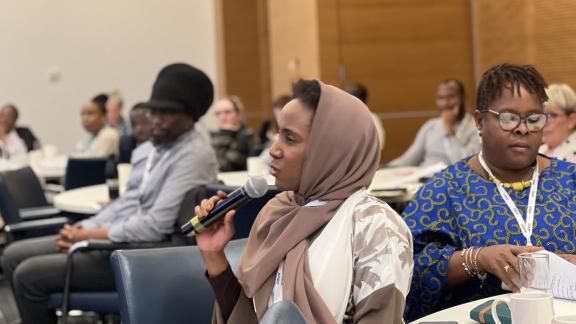Opening remarks
Joan Saddler OBE, director of partnerships at equality at the NHS Confederation opened the event by making reference to Black History Month and the theme of reclaiming narratives serving as a call to tell “our stories, our way”. She challenged those in the room to be part of a history and legacy that “will be kind to us” as leaders and agents for change.
Jagtar Singh OBE, member of the BME Leadership Network Steering Group and co-chair of the Asian Professionals National Alliance spoke about the importance of connection and making events like the lecture count by asking oneself "What is going to be different by me being here today?"
Richard Stubbs, co-chair of the BME Leadership Network and CEO of the Health Innovation Yorkshire and Humber used his opening remarks to ground the event in the context of this summer’s riots and the impact on BME communities and NHS staff, pointing out that “These events impacted the service and we need to acknowledge that. For all directly impacted there are thousands indirectly impacted by the weathering impact of witnessing racism.”
Richard reminded the room of the importance to continue challenging narratives in the face of despair and that recognising achievements can sit alongside acknowledging just how much further there is to go on this agenda.
Professor Stephani Hatch
Professor Hatch started her presentation with a quote taken from a report Ethnic Inequalities in Healthcare: A Rapid Evidence Review, published by the NHS Race and Health Observatory.
“Ethnic inequalities in health outcomes are evident at every stage throughout the life course, from birth to death.”
She highlighted that it’s not just how we identify inequalities but how we tackle them. Taking a life course narrative, in which we bear the burden of being exposed to cumulative adversity not only affects our health, but how our bodies are treated in health services.
We can't just focus on racial inequalities without acknowledging the different systems of oppression and intersectionality.
Racism is internalised and we don't often talk about that. Racism unfairly advantages/disadvantages groups and drains society of resources.
How does it work?
- Racialisation- the development of racial categories that are then placed in hierarchy.
- Anticipation of discrimination impacts health, especially mental health.
- Witnessing discrimination is impactful, as well as experiencing it.
We need to ask ourselves:
- Are we doing right by our international workforce? Coping skills from being born into a minority may not exist for those migrating from places where they are the majority.
- Are we providing enough support?
- How do we practice inclusion and create spaces where we feel psychologically and physically safe?
“We need a cross-system approach to everything we do. We get nowhere if we don't work together.”
Key actions
- Examine our own biases and how we might be colluding.
- Move beyond knowing that racialised cultures exist.
- Understand how they work and provide evidence of that, include those that are advantaged by inequality. Understanding how that advantage is maintained is equally important.
Confront racism
(Institutional Racism Policy Review Framework - Prof Camara Jones)
- Name racism.
- Ask the question - How is racism operating here?
- Collectively organise and strategise to act!
Interrogate structures and practices
- Revise codes of practice and conduct.
- Address the hidden curriculum.
- Failures to comply should be sanctioned.
Be courageous in holding managers and leadership to account
- Disrupt accepted norms within organisational culture.
- Expect buy-in at all levels of leadership.
- Monitor and take action on resistance and collusion against cultural safety and anti-racism practice – especially among leaders.
- The onus is on leaders to think about and demonstrate how they are NOT enabling systems of oppression.





